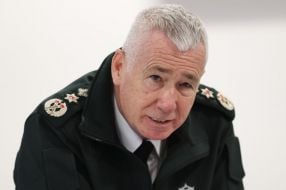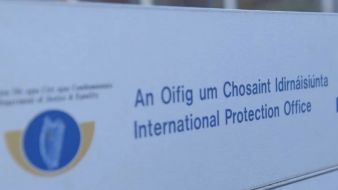The Court of Appeal has ordered the retrial of two men accused of the attempted murder of a Dublin teenager, overturning a trial judge's direction that both should be found not guilty due to a lack of evidence against them.
In March last year at the Central Criminal Court, Ms Justice Eileen Creedon directed a jury to find Jamie Berry and Stephen Mulvey not guilty of the attempted murder of a teenage boy on Dublin’s southside in 2021.
Ms Justice Creedon ruled on an application from the defence to drop the charges against Mr Berry and Mr Mulvey, who had been accused of the attempted murder of a then 17-year-old boy at a residential estate in south Dublin at around 10.55pm on the night of February 24th, 2021.
Mr Mulvey (32) and Mr Berry (28), both of Leo Fitzgerald House, Dublin 2, had both been accused of the attempted murder of the teenager at Eugene Street, Dublin 8, and of possession of a firearm, a Beretta pistol, with intent to endanger life on that date.
Mr Berry had also been accused of criminal damage to a home on Eugene Street on the same night, where a bullet passed through the front door, an internal wall and smashed through the glass of an oven cooker.
Both men had pleaded not guilty to all charges.
The trial was in its 11th day of hearing when the not guilty verdict was directed.
Criticism
In giving judgement on Monday, Court of Appeal president Mr Justice George Birmingham said the court would quash the acquittals and order a retrial.
Mr Justice Birmingham said the DPP had been critical of the trial judge for “having come to a definitive conclusion on matters which were entirely within the province of the jury”.
The DPP argued that there was “ample evidence in this case upon which a jury could conclude that the accused men had carried out the shooting and were not the unfortunate victims of a series of coincidences,” said Mr Justice Birmingham.
Mr Justice Birmingham said that while it was “inconceivable” that the judge did not approach the case in the correct manner, she did put a “focus on the frailties and limitations of the individual strands of evidence”.
During the trial, it was the State's case that Mr Berry was the shooter and Mr Mulvey was assisting along with another male not before the courts.
The trial heard two men ran from the scene of the shooting and got into a black Hyundai hatchback manned by a getaway driver waiting nearby.
The Hyundai was later found burning out at Greenville Avenue in Dublin 8, where the handgun was recovered, before three men transferred into a nearby BMW.
A black BMW was stopped near the Finglas junction on the M50 at around 11.15pm that night. The three men in the BMW 318 – including Mr Mulvey and Mr Berry – were arrested and brought to Finglas Garda Station, where they were searched.
The trial court heard evidence that a pair of gloves that were taken from Mr Berry were sent for forensic testing and revealed the presence of firearm-particle residue.
CCTV footage
Mr Justice Birmingham said that CCTV footage showing multiple purported sightings of vehicles of interest around the time of the shooting could result in a conclusion that, "beyond a reasonable doubt, the vehicles shown in the footage were central to the investigation".
Mr Justice Birmingham said one vehicle had been burned out close to the scene where a pistol was recovered and another vehicle in which the two men were occupants had been stopped by gardaí.
He said linked to the footage is the alleged identification of Stephen Mulvey running from the area some minutes after a Hyundai hatchback had been tracked there.
The judge said the prosecution’s case further alleged that firearms residue had been discovered on gardening gloves in the possession of Jamie Berry when he was stopped by gardaí 20 minutes after the shooting.
“Overall, given the primacy of the role of the jury in a criminal trial, the state of the evidence at the conclusion of the prosecution case was such that it required consideration by a jury,” said Mr Justice Birmingham.
“This was not a situation where the case could be properly withdrawn from the jury,” said Mr Justice Birmingham, who said the acquittals would be quashed and that a retrial is to be heard at the Central Criminal Court, where the case is to be listed for mention tomorrow.
Previous trial
At the Court of Appeal in December, Eilis Brennan SC, for the State, had submitted that the trial judge erred in her ruling to direct the acquittals because she had considered the individual pieces of evidence “in isolation” in making her assessments, rather than considering their “global” consequence in a circumstantial case.
Ms Brennan told the three-judge appellate court that the trial judge had enough evidence for the case to go before a jury and that she had, in directing the acquittal, assumed the role of the jury, rather than that of a judge, in considering the evidence to be so weak against the two men.
At the trial in March, counsel for both men submitted that the evidence in a circumstantial case against their clients was so "tenuous, inconsistent or vague" that the links in the circumstantial case made by the prosecution were not strong enough for the jury to infer guilt.
Ms Justice Creedon said a gun found in a burned-out Hyundai after the shooting could not be linked to either man. She said that while gloves worn by Mr Berry had firearms residue on them, it could not be found that they directly link him to being the actual shooter in the case, only that it was likely they had been worn during the discharge of a firearm.
Ms Justice Creedon said that there was no direct evidence identifying either defendant at the scene in a case where eyewitnesses could only say they saw two youths or young men running from the scene on Eugene Street on the night.
Ms Justice Creedon said that CCTV of the burning out of the Hyundai only showed "three pairs of legs" moving from the vehicle as it was set alight.
The judge said there had been no phone evidence, DNA evidence, social media evidence or evidence of motive in the case.
Ms Justice Creedon said the defence had successfully argued that "a difficulty arises when there is some evidence, but it is of such a tenuous character, because of inherent weakness or vagueness, or that it is inconsistent with other evidence, that the judge comes to the conclusion that the prosecution's case, taken at its highest, is such that a jury, properly directed, could not convict upon it, then it is the court's duty to stop the case".
The teenager also gave evidence during the trial but said that he could not remember any events on the day in question before or after his shooting and that he was on medication at the time.
Upon receiving Ms Justice Eileen Creedon's jury direction, the two men stood and celebrated in the dock, slapping hands and hugging, with Mr Berry telling his supporters in the court: "I'm going home! I'm going home soon!"







